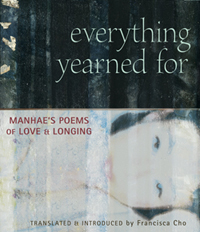
Everything Yearned For: Manhae’s Poems of Love and Longing
Francisca Cho, translator
Boston: Wisdom Publications, 2005
192 pp.; $15.00 (cloth)
It’s cause for celebration when one book can brighten so much darkness. Francisca Cho’s definitive translation of Manhae’s The Silence of Everything Yearned For is a revelatory exprience, a wonderful journey to heart of the heart, gently and wisely guided by a true master. This is the only book-length collection of poems ever published by Manhae (the pen name of the revered Korean activist-monk-poet Han Yong-un, 1879—1944). Manhae not only bore witness to the history of his time but also took a leading part in it, opposing the Japanese annexation of Korea and engaging in the struggle for his country’s sovereignty. Twice married, he published this cycle of ninety love poems at the age of forty-seven. Cho’s indispensable English-language rendition also includes several chapters of skillful commentary on the poems’ interwoven topics of Buddhism, activism, and love.
In its mode of variations on a central theme—that of love—Everything Yearned For speaks to us more deeply than any linear narrative might. Rilke’s Sonnets to Orpheus quickly comes to mind, also Whitman’s original Leaves of Grass and Tagore’s Lover’s Gift. As when approaching all visionaries, we’re asked to listen with our big ears. The words of poetry are meant to be viewed through a magnifying lens, illumined by inner light.
Consider this evocation by Manhae of “ships in the night”: “If your footsteps hadn’t awakened me / I would be riding a cloud seeking you.” There’s a subtle but stunning leap of divine imagination here worthy of Rumi. Or take in this gorgeous shimmer of synesthesia: “Has morning light like the scent of your smile ever been heard?” Such marvelous interweaving is just a hair’s breadth away from the logic-busting truth of the koan, resonating in such lines as: “It’s the flower of the desert, / it’s the full moon of the moonless night, / it’s your face.” “You” here can mean a lover, your land— and, yes, enlightenment; indeed, to remember the Buddha is to love him.
Buddhist romantic love poetry such as this serves to remind us that desire is essential to all life forms. It’s attaching self to our desires, identifying with them, that catches us in the nets of suffering—and this very recognition can lead to liberation from suffering. In good Mahayana fashion, Manhae recognizes liberation as available (where else?) smack dab within this-worldly reality. So these poems are nominally about good old swoons and heartache. Manhae maps desire spanning the gamut: separation, longing, acceptance of pain, and reunion. In the silence of true love, they’re all interdependent.
Here’s a poet’s expression of dukkha, the inherent unsatisfactory nature of phenomena: “Beauty creates parting.” Nothing lasts, not even beauty. Especially not that. Elsewhere, he tells us, “Attaining satisfaction is dissatisfaction; it’s always one step ahead.” Aha! We turn to poetry for fresh understanding, clarification, recognition.
Manhae liberally adds the medicine of the Heart Sutra’s equation (form is emptiness; emptiness is form) to his poetic mix. “In the tight bind of love’s ties lies its unbinding,” he tells us, “thus great liberation lies in bondage.” While we need to stop clinging to our suffering, to do so honestly, we must dive into our suffering. “Willing submission is sweeter than exalted freedom.” Manhae thus invites us to embrace our suffering, as he does: “As I wait for you I grow fat on anguish and tall on sadness.” Sorrow can be our common guru. And poetry can tell it like it really is.
Some poems of Everything Yearned For are as compact, plain, and formal as ballads: “The hair whitens, but the heart reddens. / The blood cools, but the tears burn. / Love’s hills are washed away but in hope’s sea the waves dance.” Others courageously reach past centuries bound by the strict forms of traditional Korean verse, as we see in this freely swinging single line: “The moonlit waves with beaded crests sway in time to the dancing grass.”
Expanding the line (and the mind) even further: “Your touch is colder than the fall wind scattering leaves on a frosty morning when chrysanthemums are in bloom.” One line. In such amplitude, we’re in the company of Whitman and Blake, the Upanishads and the Old Testament. Manhae is playing with boundaries: the line between poetry and prose, the sacred and the profane, attachment and liberation.Everything Yearned For recognizes that, honestly, we do want it all. And in the self-sufficiency of the mind, the fullness of the dharma, the completeness of this present moment, we can have it all; here, it is found in poetry’s ever-unique coexistence with silence, the blank essence noticeably shining on the margins of these pages and our lives. Love’s silence.
Thank you for subscribing to Tricycle! As a nonprofit, we depend on readers like you to keep Buddhist teachings and practices widely available.